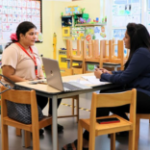
Parents are essential partners in their children’s educational journey, particularly when it comes to supporting homework and fostering a positive learning environment at home. At AR Tiny Tots International School, situated in the vibrant community of Pimpri-Chinchwad, Pune, we are dedicated to nurturing each child’s natural talents and intelligence. Through our commitment to Academic Excellence, Outstanding coaching for Sports, Best Infrastructure, Personal Attention, and Holistic Development, we recognize the crucial role parents play in enhancing students’ academic success. This comprehensive exploration delves deeply into the multifaceted role parents play in supporting homework and learning, offering practical tips and insights for creating a supportive home environment.
The Role of Parents in Supporting Homework and Learning
1. Establishing a Consistent Routine
Consistency is fundamental to developing effective homework habits. Parents can help by establishing a daily routine that includes dedicated time for homework and study. Designating a quiet, well-lit space free from distractions encourages focus and concentration. By creating and adhering to a structured routine, parents instill valuable time management skills and reinforce the importance of prioritizing academic responsibilities.
2. Providing Encouragement and Positive Reinforcement
Positive reinforcement plays a significant role in motivating children to succeed academically. Encouraging words, praise for effort, and celebrating achievements—no matter how small—boost confidence and foster a love for learning. Parents can offer guidance when needed, helping children break down complex tasks into manageable steps and providing assistance without completing the work for them. By nurturing a supportive environment, parents cultivate resilience and determination in their children’s academic pursuits.
3. Demonstrating a Positive Attitude Towards Education
Parents serve as role models for their children’s attitudes towards education. Demonstrating a positive attitude by engaging in conversations about school, asking about assignments, and showing genuine interest in their academic progress reinforces the value of learning. When parents prioritize education and demonstrate enthusiasm for intellectual growth, children are more likely to develop a strong work ethic and strive for academic excellence.
4. Creating a Conducive Learning Environment at Home
A supportive environment at home is crucial for effective studying. Parents can ensure their children have access to necessary supplies such as pencils, paper, and reference materials. Minimizing distractions, such as limiting screen time during study hours, helps maintain focus and productivity. Creating designated study areas and establishing clear expectations for homework completion create an environment where children can thrive academically.
5. Partnering with Teachers and School
Effective communication between parents and teachers is essential for understanding homework expectations and monitoring academic progress. Parents can attend parent-teacher meetings, stay informed about curriculum updates, and discuss strategies for supporting their child’s learning at home. Collaborating with teachers allows parents to address challenges early and reinforce classroom lessons effectively. By establishing a strong partnership with the school, parents demonstrate their commitment to their child’s education and promote a unified approach to academic success.
6. Encouraging Responsibility and Independence
Homework provides an opportunity for children to develop responsibility and independence. Parents can empower their children by encouraging them to take ownership of their assignments, plan their study time, and manage deadlines. By allowing children to make mistakes and learn from them, parents foster resilience and self-confidence in their academic pursuits. Balancing support with opportunities for independent learning prepares children for future academic challenges and instills a sense of accountability for their academic achievements.
7. Balancing Support with Independence
Finding the right balance between offering support and promoting independence is essential. While parents should be available to answer questions and provide guidance, encouraging children to tackle challenges on their own fosters problem-solving skills and critical thinking abilities. Empowering children to find solutions independently builds confidence and resilience, preparing them to navigate academic challenges with confidence.
8. Nurturing Lifelong Learning Habits
Beyond homework completion, parents play a vital role in nurturing lifelong learning habits. Encouraging reading for pleasure, exploring educational activities outside of school, and fostering curiosity about the world around them promote intellectual growth and a love for learning. By cultivating a thirst for knowledge and supporting intellectual curiosity, parents empower their children to become lifelong learners who actively seek opportunities for personal and academic growth.
Summary
AR Tiny Tots International School, located in the heart of Pimpri-Chinchwad, Pune, is committed to nurturing Academic Excellence, providing Outstanding coaching for Sports, maintaining Best Infrastructure, offering Personal Attention, and promoting Holistic Development. Parental involvement is integral to our students’ success, particularly in supporting homework and fostering a positive learning environment at home. By establishing consistent routines, providing encouragement, valuing education, creating a conducive learning environment, partnering with teachers, teaching responsibility, and nurturing lifelong learning habits, parents play a vital role in enhancing their children’s academic journey. Together, we can empower students to achieve their full potential and cultivate a lifelong passion for learning.




